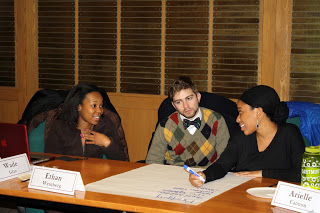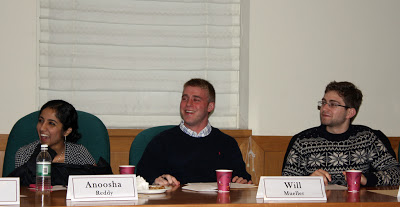The second session of the winter 2012 term began with a presentation on the philanthropic work of Jane Goodhall, presented by Fellow Annie Saunders. The theme theme of philanthropy continued throughout the night! Session speaker, Carolyn Pelzel, Senior Vice President for Advancement here at Dartmouth, delighted fellows with a presentation on effecting change, the power of philanthropy, and how philanthropy embodies effective leadership. Pelzel centered her presentation on challenging Fellow’s assumptions about philanthropy through an interactive quiz and thoughtful discussion. Pelzel argued that when you engage in philanthropy you are learning the importance of adhering to a clear mission, employing teamwork, leveraging human capital, evaluating results, and dealing with ethical dilemmas – all important leadership qualities!
-- Anna-Kay Thomas '12
The next Thursday evening session centered on student directed sessions given by current fellows to their peers. During these presentations, fellows share thoughts on someone that they consider a leader. During the January 19th RLF, the following students gave the following presentations:
- [in the format of Fellow Name: Leader they Covered]
- Arielle Cannon: Paul Robeson
- Rebecca Gotlieb: Eli Broad
- Wills Begor: Paul Tudor Jones
- Jason Goodman: Michelle Rhee
- Max Pillsbury: Bishop Bill Swing
- Anoosha Reddy: Donald Trump
- Michelle Shankar: Jacqueline Novogratz
- Hikaru Yamagishi: Raichō Hiratsuka

In this last session of January 2012, Dartmouth Professor Ron Shaiko and Fellows discussed the interrelationships between three political and social concepts: civil society, social capital, and leadership. Shaiko discussed with fellows how leadership in the nonprofit, voluntary sector is perhaps more difficult due to the nature of follower-ship in the sector and then began to discuss how bonding and bridging social capital is manifested here at Dartmouth. Fellows engaged with each other by participating in a session activity that had them list the Dartmouth events and organizations they deemed to be bonding or bridging Dartmouth social capital. Shaiko debriefed with Fellows after this session and concluded by noting that creating and maintaining social networks and utilizing such networks for the common good are not the easiest of tasks for civil society leaders but is crucial to achieving a truly bridged social society.
-- Anna-Kay Thomas '12

